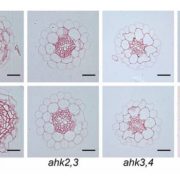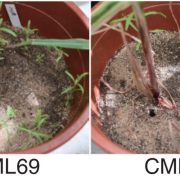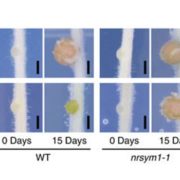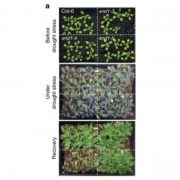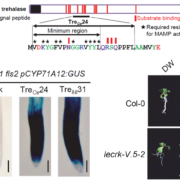Microbial interkingdom interactions in roots promote Arabidopsis survival (Cell)
Plant roots in soil are surrounded by different microorganisms such as bacteria, fungi and oomycetes. 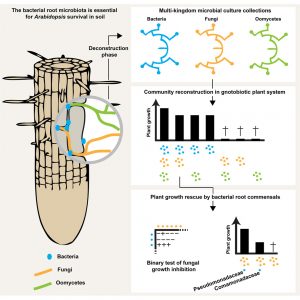 The impact of these organisms on plant health has been known f0r many decades. However, the interaction network between these organisms is not well understood. By using next generation sequencing as a tool, Duran et al. profiled root associated multi-kingdom microbial communities in Arabidopsis. The data reveal that the relative abundance between bacterial and fungal community members are negatively correlated. Additionally, geographically distant Arabidopsis showed a similar bacterial microbial consortium while fungal and oomycete communities seemed to be distinct and site specific. This confirms plant specific effects on root-associated bacterial microbiota, which is consistent with previous reports. Selected bacterial, fungal and oomycete culture collection were used to reconstitute the microbiome under laboratory conditions, to investigate interkingdom competition. These studies suggest that plant root-associated bacterial populations execute a protection role to outcompete against the detrimental activities of filamentous eukaryotes, revealing their potential as biocontrol agents against filamentous pathogenic microbes. (Summary by Mugdha Sabale) Cell: 10.1016/j.cell.2018.10.020
The impact of these organisms on plant health has been known f0r many decades. However, the interaction network between these organisms is not well understood. By using next generation sequencing as a tool, Duran et al. profiled root associated multi-kingdom microbial communities in Arabidopsis. The data reveal that the relative abundance between bacterial and fungal community members are negatively correlated. Additionally, geographically distant Arabidopsis showed a similar bacterial microbial consortium while fungal and oomycete communities seemed to be distinct and site specific. This confirms plant specific effects on root-associated bacterial microbiota, which is consistent with previous reports. Selected bacterial, fungal and oomycete culture collection were used to reconstitute the microbiome under laboratory conditions, to investigate interkingdom competition. These studies suggest that plant root-associated bacterial populations execute a protection role to outcompete against the detrimental activities of filamentous eukaryotes, revealing their potential as biocontrol agents against filamentous pathogenic microbes. (Summary by Mugdha Sabale) Cell: 10.1016/j.cell.2018.10.020


